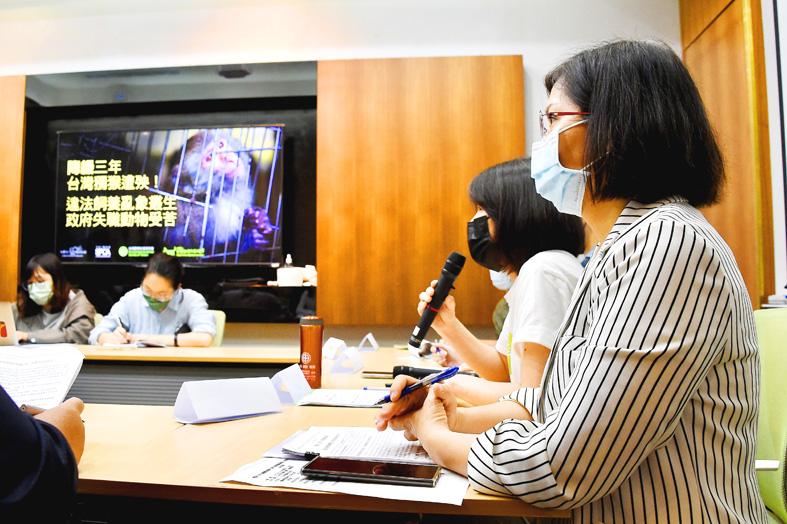An animal rights group on Thursday called for a ban on raising or trading Formosan rock macaques, after releasing a video showing captive primates being abused, including one incident of a monkey chained along a hiking trail as entertainment for tourists.
In the video released at a news conference in Taipei hosted by the Environmental and Animal Society of Taiwan, Taiwan Macaque Coexistence Promotion Association and Taiwan Society for the Prevention of Cruelty to Animals, among others, a man is heard talking about how he keeps a captive macaque a manageable size.
“An older man advised me that it’s better not to give it water,” he says. “It would otherwise get bigger. See it is still small? This is because I never give it water.”

Photo: Tu Chien-jung, Taipei Times
Advocates said the man in the video had kept the monkey captive for eight or nine years since it was an infant.
In most cases, the Formosan rock macaques, the nation’s only endemic primates, are poached as babies in incidents that “involve the deaths of their mothers,” two women interviewed in the video say.
Because Formosan rock macaques and their babies usually hold each other tightly, some poachers kill the mothers and set off fireworks to scare the infants to loosen their grasp so they can take them, the women say.
In one scene, a man is shown putting a macaque’s paw into a miniature guillotine and feigning triggering the device. In another, a monkey is shown chained along a hiking trail for the purpose of entertaining tourists.
The video also documented a Formosan rock macaque, which had reportedly been held in captivity for 12 years and had hair loss on its tail, walking continuously in a circle in a small cage.
Another monkey, allegedly confined to a cage for eight years, is seen covering itself with a blanket and kowtowing repeatedly.
The groups said that abuse similar to that shown in the video had “run rampant” since 2019, when the Council of Agriculture’s Forestry Bureau removed the Formosan rock macaque from its “protected species” list and categorized them as “general wildlife” under the Wildlife Conservation Act (野生動物保育法).
At the time, the council said that Formosan rock macaque numbers had “stabilized” and their habitats were “well maintained.”
The move was seen by animal rights advocates as bowing to the demands of farmers who wanted to legally remove monkeys that had damaged their crops.
Since the reclassification, animal rights groups have set up hotlines for the public to report incidents of Formosan rock macaques being held in captivity illegally, and have since received 151 reports.
Under the Wildlife Conservation Act, hunting, raising or trading “protected species” is prohibited, with contraveners facing fines of NT$300,000 to NT$1.5 million (US$10,303 to US$51,515) along with a maximum jail sentence of five years.
People convicted of poaching animals categorized as “general wildlife” face a more lenient fine of NT$60,000 to NT$300,000, with no criminal penalty.
Raising, trading or hunting animals in the category is permitted in certain circumstances, including for example for farmers seeking to protect their crops.
Democratic Progressive Party Legislator Lin Shu-fen (林淑芬), who also spoke at the news conference, demanded the Forestry Bureau draw up new rules to crack down on the poaching, breeding and trading of Formosan rock macaques.

Nipah virus infection is to be officially listed as a category 5 notifiable infectious disease in Taiwan in March, while clinical treatment guidelines are being formulated, the Centers for Disease Control (CDC) said yesterday. With Nipah infections being reported in other countries and considering its relatively high fatality rate, the centers on Jan. 16 announced that it would be listed as a notifiable infectious disease to bolster the nation’s systematic early warning system and increase public awareness, the CDC said. Bangladesh reported four fatal cases last year in separate districts, with three linked to raw date palm sap consumption, CDC Epidemic Intelligence

Two Taiwanese prosecutors were questioned by Chinese security personnel at their hotel during a trip to China’s Henan Province this month, the Mainland Affairs Council (MAC) said yesterday. The officers had personal information on the prosecutors, including “when they were assigned to their posts, their work locations and job titles,” MAC Deputy Minister and spokesman Liang Wen-chieh (梁文傑) said. On top of asking about their agencies and positions, the officers also questioned the prosecutors about the Cross-Strait Joint Crime-Fighting and Judicial Mutual Assistance Agreement, a pact that serves as the framework for Taiwan-China cooperation on combating crime and providing judicial assistance, Liang

The manufacture of the remaining 28 M1A2T Abrams tanks Taiwan purchased from the US has recently been completed, and they are expected to be delivered within the next one to two months, a source said yesterday. The Ministry of National Defense is arranging cargo ships to transport the tanks to Taiwan as soon as possible, said the source, who is familiar with the matter. The estimated arrival time ranges from late this month to early next month, the source said. The 28 Abrams tanks make up the third and final batch of a total of 108 tanks, valued at about NT$40.5 billion

Reports of Taiwanese going missing, being detained or interrogated, or having their personal liberties restricted in China increased about fourfold annually last year, the Mainland Affairs Council (MAC) said yesterday. Last year, 221 Taiwanese who traveled to China were reported missing, were detained and interrogated, or otherwise had their personal freedom restricted, up from 55 the previous year, the council said. Reopening group tours to China would be risky, as it would leave travelers with no way to seek help through official channels after Beijing shut down dialogue between the associations tasked with handling cross-strait tourism, the MAC said. Taipei’s Taiwan Strait Tourism